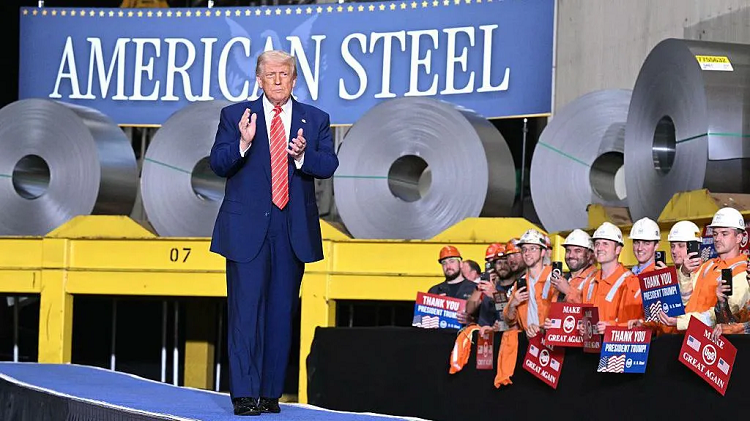On June 3 local time, U.S. President Trump signed an executive order announcing the abrupt increase of tariffs on imported steel, aluminum, and their derivatives from the current 25% to 50%. This policy adjustment took effect at 12:01 a.m. Eastern Time on June 4, with the UK as the sole exception, maintaining its steel and aluminum tariffs to the U.S. at 25%. Like a bombshell, this decision has sent shockwaves through the global trade landscape. As a key application sector for aluminum products, the aluminum beverage can industry is bearing the brunt of multi-faceted impacts and transformations.
1. Surging Costs: Shaking the Industry Foundation
As the core raw material for aluminum cans, the drastic tariff hike has caused a sharp rise in raw material procurement costs. Data from the Aluminum Association shows that the U.S. consumed 61 billion aluminum cans in 2024, reflecting enormous market demand. However, the U.S. domestic aluminum smelting capacity is severely insufficient to meet domestic needs, leading to long-term reliance on imports. According to the U.S. Geological Survey (USGS), approximately 50% of aluminum in the U.S. was imported in 2024, with Canada—the largest supplier—accounting for 32 million tons of imports. The tariff increase from 25% to 50% has caused a significant surge in imported aluminum prices. Taking Canadian aluminum as an example, this directly inflates procurement costs for enterprises.
2. Supply Chain Turbulence: Dual Pressures on Production and Recycling Systems
Facing cost pressures, can manufacturers are adjusting production strategies. Some enterprises are considering reducing aluminum can production capacity and exploring alternative materials or optimizing product mixes. For instance, Coca-Cola has publicly stated that if tariffs raise aluminum can costs, it may increase the use of plastic bottles in the U.S. market. This shift could not only alter the industry’s product structure but also lead to idle or retrofitted production equipment, triggering a chain reaction of resource reallocation and impacting upstream aluminum processing equipment manufacturers and downstream beverage packaging markets.
Although the U.S. has a relatively high recycling rate for used aluminum cans, the tariff adjustment introduces complex challenges to the recycling industry. Theoretically, rising new aluminum import costs could increase demand for recycled aluminum due to its cost advantages. However, reality is more complicated: regions like California already suffer from flawed recycling systems, with declining can recycling rates. If the recycling system fails to promptly meet demand, the shortage of recycled aluminum could further intensify supply tensions, threatening the raw material stability for can manufacturers.
3. Market Competition Reconfiguration: Domestic Shuffling and Global Diversification
In the short term, U.S. domestic aluminum can producers may appear to benefit, as higher import costs could secure their market share. Long-term, however, across-the-board cost increases will intensify competition among domestic firms. To capture limited market share, enterprises will engage in fierce rivalry in pricing, product quality, and service. Weaker players may be eliminated due to cost pressures, accelerating market consolidation toward large-scale dominant enterprises.
Internationally, the tariff hike will reshape global aluminum can trade flows. Exporters previously focused on the U.S. market may shift to other regions, intensifying competition elsewhere. This creates opportunities for emerging-market local enterprises—for example, Southeast Asian aluminum packaging firms may gain more orders from U.S. market shifts, gradually enhancing their global competitiveness and restructuring market dynamics.
4. Consumer Impact: Price Hikes Triggering Behavioral Changes
Increased aluminum can costs will trickle down to consumers through the supply chain. When can manufacturers and beverage producers pass cost increases to product prices, retail prices of canned drinks will rise. Robert Budway, President of the Association of American Can Manufacturers, noted: “We will pass these increases to our customers (food producers, soft drink manufacturers, and brewers), who will in turn pass them to consumers.” Facing higher prices, consumers may reduce canned drink purchases, switching to alternative packaging or cutting overall consumption—a ripple effect that will impact beverage sales and loop back to the aluminum can industry.
China’s Aluminum Can Industry: A Critical Juncture in Global Value Chain Reconstruction
The next 3–5 years will be a pivotal period for China’s aluminum can industry to reshape its global value chain:
Short term: Enterprises must mitigate high tariffs through capacity relocation to markets like Mexico and Europe, safeguarding export stability.
Mid term: Achieving technological upgrades in recycled aluminum and lightweighting breakthroughs is imperative to overcome strict environmental barriers in Europe and the U.S., enhancing green competitiveness.
Long term: Building a full-industry-chain closed loop of “design-recycling-remanufacturing” will strengthen supply chain integration, improve resource efficiency, and reduce costs.
China’s core competitive edge will transition from “low-cost manufacturing” to “sustainable innovation.” Through continuous R&D investment, upgraded product design, optimized processes, and robust recycling systems, Chinese enterprises can transform from product manufacturers to value creators, securing a stronger global position and driving the industry toward high-quality, sustainable development.
About Erjin Packaging
As a global leading packaging solutions provider, Erjin Packaging has established deep industry expertise and extensive influence. With eight production bases in China, the company has built an efficient, synergistic manufacturing network to deliver high-quality packaging products and professional services worldwide. With over 20 years of expertise in aluminum can exports, Erjin has accumulated rich international trade experience and a stable client base. Focused on the beverage and beer industries, its diversified product portfolio includes core packaging like aluminum cans, bottles, and lids, as well as supporting equipment such as sealers, beer kegs, and can trays—offering one-stop solutions from containers to auxiliary tools. Leveraging advanced production processes, strict quality control, and a global service network, Erjin continuously empowers renowned domestic and international beverage brands, enhancing their product competitiveness and establishing a reputation for “professionalism, innovation, and reliability” in global packaging markets.
Post time: Jun-06-2025









